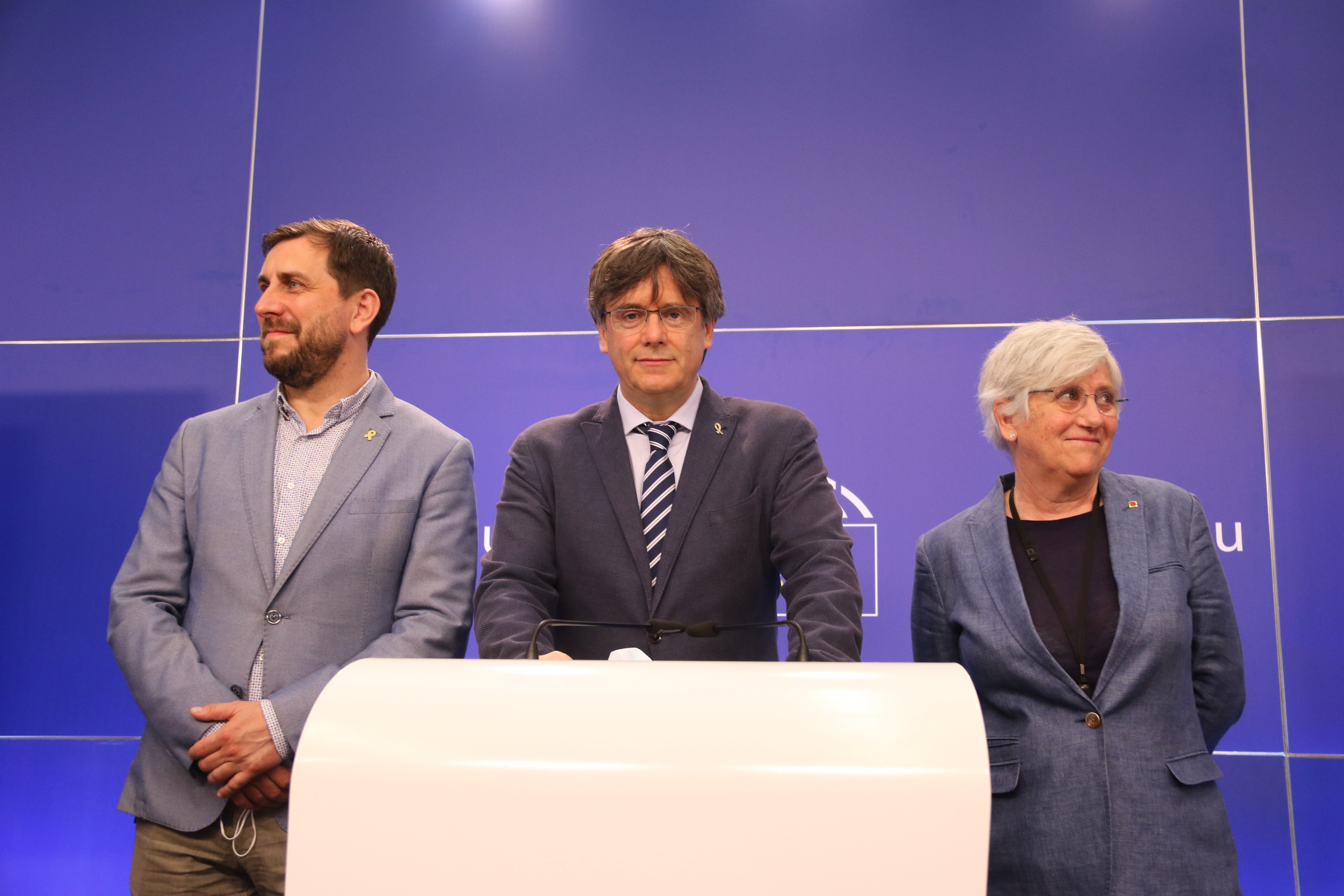They are MEPs and they exercise freely as such. The full Spanish Constitutional Court, in a judgment drafted by judge Cándido Conde-Pumpido, has dismissed the appeal for constitutional protection lodged by the Catalan president-in-exile Carles Puigdemont and former government minister Toni Comín which questioned the 2019 decision of the Central Electoral Board (JEC), judicially ratified by the Supreme Court, not to include them in the list of elected representatives communicated to the European Parliament on the basis that they did not swear allegiance to the Constitution in Madrid after the elections held on May 26th 2019.
In a resolution communicated this Tuesday, the constitutional judges affirm that the European Parliament, in its session of January 13th, 2020, accepted their election as members with retroactive effect from July 2nd, 2019, and consequently, from that date both were authorized to assume their functions, to exercise their mandates as representatives and to occupy their seats, fully exercising from then on the rights corresponding to the representative positions to which they were elected. And, having been recognized as MEPs, their main claim to protection was lost and the court therefore dismissed their appeal. Thus, the appeal by the two Catalans was rejected, and yet the reasons for its rejection provide a very timely and important reaffirmation.
The EU Parliament, the JEC and Puigdemont
It is the circumstance thus described, subsequent to the JEC accords which they were disputing, that makes it clear that Puigdemont and Comín "obtained, de facto, extra-procedural remedy for their claims for the restoration or preservation of the fundamental rights denounced, and for that reason the possible injury done to them does not continue". Thus, the Constitutional Court then asserts that the procedural nature of constitutional protection makes it inappropriate to rule on "purely declarative claims unrelated to a real and effective injury to the rights that are invoked". And as a result of "the circumstance set out", it is possible to appreciate the "extinction of the object of the main claim for protection, and of all its derivatives, which justifies the rejection of the claims presented", it concludes.
The timeliness of the court's judgment is that it arrives in the middle of a sequence in which the European chamber had requested information from the JEC about the credentials as MEPs of Puigdemont, Comín, Clara Ponsatí and Jordi Solé. Specifically, the president of the European Parliament, Roberta Metsola, had asked the Spanish electoral body to confirm whether the four MEPs mentioned are in the list of the 59 Spanish positions proclaimed elected in the European elections in 2019, after the the chamber's Legal Affairs Committee was unable to verify the MEPs' credentials. In response to the parliamentary president, the JEC took a position against the European Court of Justice, attempting to put in doubt their status as MEPs: it said that Puigdemont and the others had to swear on the Constitution in Madrid to become MEPs.
The Constitutional Court's responses
After the JEC's reply, the European Parliament stated that the chamber's legal team would examine the "consequences" of what the Spanish electoral body had expressed. But as well, a group of Italian MEPs urged Metsola to defend David Sassoli's legacy from Spanish contempt, since in its response, the JEC took the opportunity to criticise the decision of the now-deceased president of the European chamber for having recognized Puigdemont, Comín, Ponsatí and Solé as MEPs. "We are deeply shocked by the words and the tone with which an official body of the Spanish electoral administration denigrates the work of the former president of the European Parliament, David Sassoli," they expressed in a letter.
Before all this, in February of this year, the Spanish Constitutional Court had already declared Puigdemont's appeal extinguished due to the fact that he had become a member of the European Parliament: that is, it did not admit the president-in-exile's appeal against the JEC's decision not to recognize them as MEPs. Puigdemont and Comín had asked the Supreme Court to provisionally grant them credentials and immunity as MEPs, but the court rejected the interim measures requested at that time. Two years later, the Constitutional Court did not admit the appeal for constitutional protection that had been presented to it in 2019 for the alleged violation of the right to a process with proper legal guarantees. At that time, the court also declared extinguished the appeal for "unexpected ineligibility of the subject", since both had by become representatives in the European Parliament. Gonzalo Boye merely recalled that the TC's response was two years late. On the other hand, the court did admit the appeal of former minister Clara Ponsatí against the denial of the suspension by the Supreme Court in the case (20907/2017) against the Catalan independence leaders.

